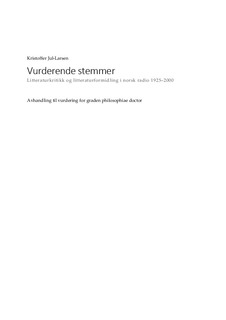Vurderende stemmer : Litteraturkritikk og litteraturformidling i norsk radio 1925–2000
Doctoral thesis
Published version
Permanent lenke
http://hdl.handle.net/11250/2640579Utgivelsesdato
2020Metadata
Vis full innførselSamlinger
Originalversjon
Jul-Larsen, K. (2020). Vurderende stemmer: Litteraturkritikk og litteraturformidling i norsk radio 1925–2000 (Doktoravhandling). Norges Teknisk-Naturvitenskapelige Universitet, Trondheim.Sammendrag
Avhandlingen er en historisk undersøkelse av norsk radios litterære formidlingsarbeid, herunder litteraturformidling, litteraturfagformidling og litteraturkritikk i perioden 1925 til 2000. Denne litterære og pedagogiske praksisen i norsk offentlighet har aldri tidligere blitt underlagt et samlende blikk. Radiohistorie, kulturjournalistikk generelt og litteraturformidling i ikke-tekstbaserte medier er alle underbelyste saksområder, både i litteraturfaget og i medievitenskapen. Avhandlingen er et bidrag til å bedre denne situasjonen. Fremstillingen tar utgangspunkt i tre overordnede forskningsspørsmål som utgjør avhandlingens samlede problemstilling: For det første undersøkes spørsmålet om litterær verdivurdering og hvordan denne utøves i radiomediet. Hva er litteraturkritikkens radiospesifikke historie, uttrykk og innhold? For det andre undersøkes litteraturformidlingens forbindelse til nasjonens dannelse i en offentlighet hvor litteraturen i økende grad har blitt utfordret av andre medier. Hva har kjennetegnet litteraturen og litteraturfagets forhold til den større nasjonale radiooffentligheten? Og for det tredje undersøker avhandlingen hvordan radiomediets materielle kvaliteter påvirker det litterære formidlingsstoffet. Disse tre forskningsspørsmålene er nært knyttet til hverandre, og undersøkes så å si samtidig. Den sentrale konflikten som dukker opp i løpet av undersøkelsen befinner seg i forholdet mellom litteraturformidlingens ulike formål i norsk radio. Den statseide norske radioens sterke institusjonelle utsigelseskraft har gjort det til en komplisert oppgave å balansere underholdning, opplysning og kritikk. Avhandlingen diskuterer alt fra litteraturkritikk og historiske foredrag til forfatterintervjuer og lesersamtaler til opplesninger og dramatiseringer, selv om det er litteraturkritikken og dens utøvelse som oftest undersøkes. Radio i Norge har i store deler av perioden 1925–2000 vært ensbetydende med NRK, og det kan vanskelig overdrives hvor viktig denne institusjonen har vært for radioens utvikling i Norge. Avhandlingen tilbyr et annerledes blikk på den litteraturhistoriske tradisjonen og på litteraturfagets selvforståelse ved å kombinere institusjonshistoriske og mediespesifikke perspektiver på materialet; den bidrar med ny kunnskap om hvilke former for litterær forståelse som har vært mulig å formidle til ulike tider i norsk kringkasting, og den tilveiebringer nye innsikter om hvilken plass litteraturen til forskjellige tider har blitt tildelt i offentligheten. The dissertation is a historical examination of the dissemination of literature, literary studies and book reviews in Norwegian radio in the period 1925–2000. There has never before been conducted a comprehensive study of this literary and pedagogical practice. Radio history, cultural journalism in general and the dissemination of literature in non-text-based media are all under-researched fields of study, in both literary and media studies. The dissertation is an attempt to improve this situation. The presentation takes as its starting point three overarching research questions, which taken together form the dissertation’s project: Firstly, the question of literary evaluation and its practice in radio is examined. What is the radio specific history of literary criticism, its form and content? Secondly, the relationship between the dissemination of literature and national Bildung in a public sphere where literature increasingly has been challenged by other media is considered. What are the characteristics of the relationship between the radio-mediated national arena and literature and literary studies? Thirdly, the dissertation analyses how the material qualities of the radio medium affect the literary content. These three research questions are closely related and are studied virtually simultaneously. The central tension discovered through this investigation is located between the conflicting purposes of literary dissemination in Norwegian radio. The powerful institutional position of a state-owned broadcaster has made it a complicated endeavour to balance entertainment, Bildung and literary evaluation. The dissemination of literature can entail everything from book reviews and historical lectures to interviews with writers and conversations with readers, to readings and dramatizations. All these forms of dissemination are discussed here, even if the book review and its practice is most often analysed. For the greater part of 1925–2000, Norwegian radio has been tantamount to the Norwegian Broadcasting Corporation, and this institution’s importance for the development of radio in Norway can hardly be overstated. The dissertation offers an unusual view on literary history’s history and the self-conception of literary studies, by combining media-specific and institutionally historical perspectives on the material. It also develops new knowledge about the forms of literary comprehension have been possible to communicate at different times in Norwegian broadcasting. Finally, the dissertation makes available new insights into the historically changing position of literature in the Norwegian public sphere.
